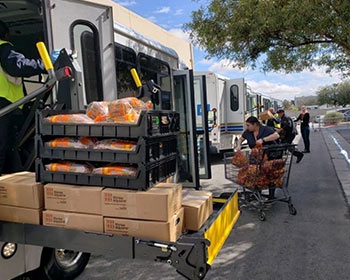Project Details
| Title: | What Role Does Public Transportation Play to Help Solve Access to Food Issues in Rural and Small Urban Areas of the United States? |
| Principal Investigators: | Hamad Al Qublan and Jill Hough |
| Start Date: | November 2020 |
| End Date: | July 2022 |
| Status: | Completed |
Abstract
 Image credit: Regional Transportation Commission of Southern NevadaLack of money is just one factor that causes food insecurity. Lack of transportation also impacts food security problems. Transportation and transit agencies play a role in addressing the food desert situation impacting Americans. The USDA defines food access as the spatial accessibility to supermarkets, supercenters, grocery stores, and affordability of food retailers, specifically such factors as travel time to shopping, availability of healthy foods, and food prices relative to transportation and socioeconomic access resources of food buyers. They also define a food desert as an area that has a limited access to affordable and nutritious food.
Image credit: Regional Transportation Commission of Southern NevadaLack of money is just one factor that causes food insecurity. Lack of transportation also impacts food security problems. Transportation and transit agencies play a role in addressing the food desert situation impacting Americans. The USDA defines food access as the spatial accessibility to supermarkets, supercenters, grocery stores, and affordability of food retailers, specifically such factors as travel time to shopping, availability of healthy foods, and food prices relative to transportation and socioeconomic access resources of food buyers. They also define a food desert as an area that has a limited access to affordable and nutritious food.
In order to help increase food access for transit-dependent populations affected by COVID-19 hardships, some transit agency providers connected with local organizations to deliver food in order to increase food access and minimize non-essential travel. This project seeks to identify the transit agencies' roles in reducing food deserts and increasing food access in the U.S.; identify the transit agencies' abilities for food delivery to customers' homes; measure the transit agencies' willingness to collaborate with food banks in their areas; and document best practices of rural transit agencies participating in reducing food deserts in the United States.
Project Deliverables


